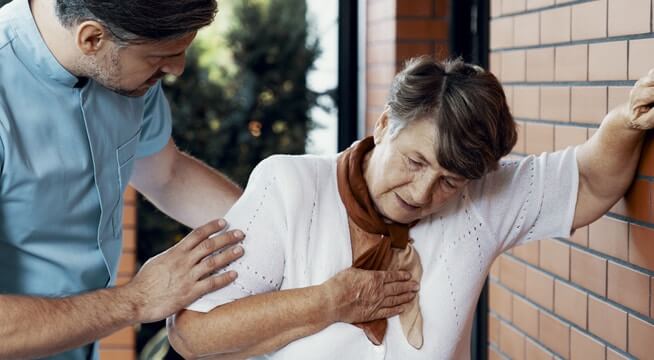Shortness of Breath: Symptoms, Causes, & More
Conditions
•
Oct 24, 2019

At some point in your life, you’ve probably become familiar with the phrase you take my breath away. While this phrase is typically used for the effect someone has on another person, it can also apply to a variety of medical conditions including asthma, allergic reactions, low blood pressure, and more.
Regardless of the reason, shortness of breath — also known as dyspnea — is usually a symptom of a greater issue. To keep you and your loved ones safe, you should learn how to recognize the signs and understand the causes that can impact your oxygen intake.
What is Dyspnea?
When you have shortness of breath, it typically means that you’re struggling to get enough air in your lungs. A healthy adult typically breaths in and out around 20 times a minute. Things like extraneous workouts and conditions like a cold can impact that number, but these conditions should never leave you feeling short of breath. If you have dyspnea or shortness of breath, then breathing will be more difficult – and no matter how much you breathe in, it won’t feel like enough air.
Symptoms of Dyspnea
Along with feeling out of breath and having difficulty breathing, common symptoms include:
- Tightness in your chest
- Swelling in your feet and ankles
- Lips or fingertips turning blue
- Wheezing
- High fever
- Coughing
If your shortness of breath occurred very suddenly and is accompanied by chest pain or nausea, you should call 911 immediately as you may need immediate medical attention. This could be a sign of a heart attack.
What Causes Shortness of Breath?
Your heart and lungs are the most commonly used muscles for transporting oxygen to your body and removing carbon dioxide. That’s why most causes of dyspnea involve these organs, but they aren’t the only organs to impact breathing. There’s a variety of minor to severe conditions that cause shortness of breath. Some common causes include:
- Anxiety
- Asthma
- Broken ribs
- A collapsed lung
- Heart disease/failure
- Pneumonia
- Pregnancy
- Sudden blood loss
- Chronic obstructive pulmonary disease
- Obesity
- Inflammation of the heart tissue
If you have shortness of breath while walking, this could simply be a sign that you are out of shape and not a symptom of a greater condition. If you have shortness of breath while talking, then this is a sign that it could be a heart or lung condition.
Risk Factors of Dyspnea
As with a variety of other conditions, smoking can be a major risk factor as it can result in many diseases with shortness of breath as a symptom. Preexisting conditions like asthma or muscle weakness can also increase your risk. Other risk factors may include:
- Lung disease
- Low hemoglobin
- Being out of shape
- Obesity
Diagnosing & Treating Shortness of Breath
If your shortness of breath is not caused by extraneous exercise or was an expected result of another activity, occurred suddenly, or is persistent across daily activities that weren’t previously a problem, then you should visit an emergency care clinic immediately. A doctor will be able to conduct a physical and determine the cause of your shortness of breath. Your doctor may ask you questions and conduct other tests to determine if you have dyspnea and what is causing it.
If your dyspnea is caused by asthma, your doctor will prescribe you with an inhaler to help make breathing easier. You may also be prescribed medications to help dissolve blood clots or resolve infections that are causing your shortness of breath. If you smoke, your doctor will request that you quit. Your treatment plan may also include lung strengthening exercises to help you improve your health. If your symptoms change or worsen, you should call your doctor.
Emergency Services in Colorado Springs and Texas
If you or a loved one is experiencing shortness of breath, we can provide the care you need. If you have questions or need immediate treatment, your nearest Complete Care location is ready to help, no matter the time of day or night. We offer a variety of services to help you and your family in your time of need. No appointments are necessary.
Find the Complete Care location nearest you.
